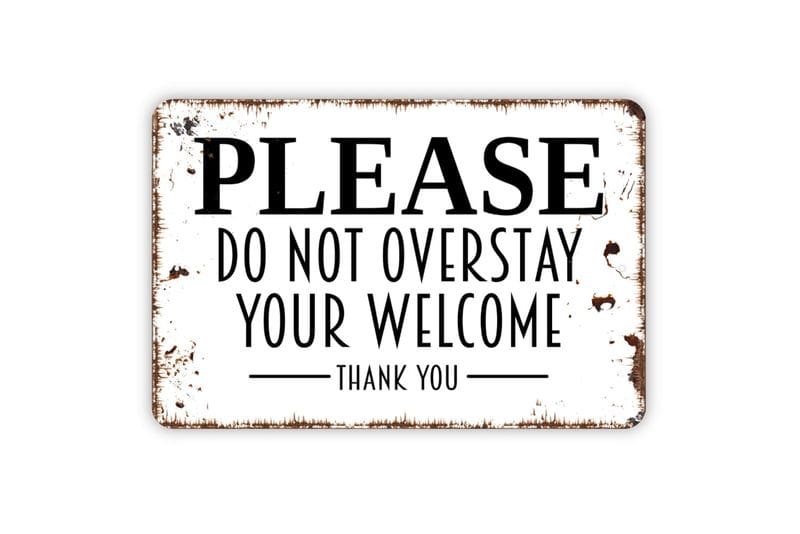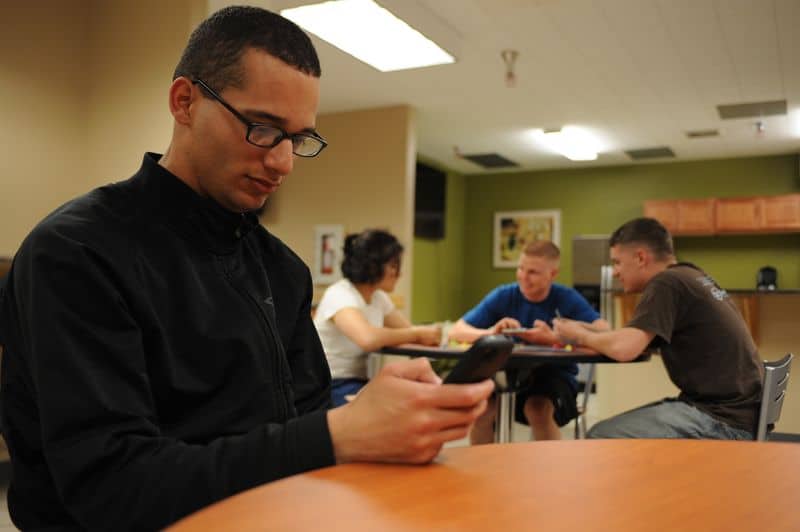Being a guest in someone’s home is a privilege that comes with certain unspoken rules of etiquette. While most people strive to be polite and considerate, there are subtle signs that can indicate you’re being a rude guest without even realizing it.
Understanding these nuances can make a significant difference in how you’re perceived and can help prevent any unintended offense. From overstaying your welcome to taking liberties with household items, there are numerous ways a guest can inadvertently cross boundaries.
Overstaying Your Welcome

It’s easy to lose track of time when you’re enjoying yourself, but overstaying your welcome can be inconsiderate. Pay attention to the host’s cues, like yawning or starting to clean up, as signs it’s time to leave. Overstaying can place undue pressure on your host, who might have other commitments or simply need some personal time. Always pre-agree on a reasonable time to leave, and if circumstances change, communicate openly. Being attentive to these signals ensures you respect your host’s space and time, maintaining a positive relationship for future visits.
Bringing Unannounced Plus-Ones

Showing up with an unannounced guest can throw off your host’s plans, especially if they have prepared resources or seating for a specific number of people. It can lead to uncomfortable situations where the host has to scramble to accommodate everyone. To prevent such awkwardness, always inform your host in advance if you wish to bring someone along. Respect the host’s decision if they cannot accommodate additional guests. Clear communication ensures everyone enjoys the occasion without unnecessary stress.
Ignoring House Rules

Disregarding house rules is a surefire way to upset your host, even if unintentionally. Whether it’s about shoe removal, pet restrictions, or noise levels, these rules exist for a reason. By ignoring them, you might disrupt the household routine or damage property. To avoid this, always ask your host about any specific guidelines when you arrive. Showing respect for their preferences reflects well on you and ensures a harmonious visit. It also demonstrates your willingness to adapt and keep the peace.
Taking Liberties with Food and Drink

Helping yourself to food and drink without asking can be perceived as presumptuous. Although some hosts might encourage guests to feel at home, it’s always polite to ask before taking anything. This simple act of courtesy ensures you respect boundaries and avoid taking something reserved for another occasion. If you’re unsure, offer to bring your own snacks or beverages. This gesture shows thoughtfulness and a willingness to contribute to the gathering, minimizing any potential awkwardness.
Monopolizing the Host’s Time

Dominating your host’s time can prevent them from attending to other guests. While it’s important to engage and show interest, remember to allow your host to mingle freely. This ensures everyone feels included and the host can manage the flow of the event smoothly. If you find yourself chatting extensively, gracefully exit the conversation to allow the host to engage with others. This conscious effort helps maintain a balanced social dynamic and showcases your social awareness.
Neglecting to Offer Help

Failing to offer assistance, especially during meals, can appear inconsiderate. Whether it’s helping with dishes or setting the table, extending a helping hand shows appreciation for your host’s efforts. Even a simple offer to assist acknowledges the host’s work and lightens their load. If your offer is declined, the gesture itself is often enough to convey your gratitude. Such small acts can significantly enhance the atmosphere and reflect positively on your character as a considerate guest.
Using Personal Devices Excessively

Constant use of personal devices can come off as rude, suggesting disinterest in the company present. Being glued to your phone or tablet can signal that you’re not fully engaged in the social experience. To foster genuine connections, try to keep device usage to a minimum and participate in conversations instead. Your attention to the present moment can profoundly enrich interactions and shows respect for the effort your host has put into organizing the gathering. It’s a simple way to express that you value the social time shared.
Arriving Late Without Notice

Arriving late can inconvenience your host and other guests, disrupting schedules and causing delays. It’s courteous to inform your host ahead of time if you’re running late, allowing them to adjust plans accordingly. Punctuality shows respect and consideration for everyone’s time and effort. If lateness is unavoidable, a quick message or call can ease tensions. Being mindful of timing helps maintain the event’s flow and reduces stress for your host, ensuring a smoother, more enjoyable gathering for all.
Assuming Overnight Stays

Presuming an overnight stay can catch your host off-guard, especially if they haven’t prepared for it. Always confirm arrangements beforehand to avoid putting your host in an uncomfortable position. By assuming accommodations, you might be inconveniencing their schedule or personal plans. Open communication about your plans not only respects their space but also allows them to prepare adequately. This approach keeps boundaries clear and supports a smoother, more pleasant experience for both parties involved.
Being Unnecessarily Critical

Critiquing your host’s home, even in jest, can be hurtful. It’s important to maintain a positive atmosphere and avoid making comments that might offend. Remember, you’re a guest in someone’s personal space, and sensitivity in your remarks is crucial. Focus on the positives and express genuine appreciation for the invitation and hospitality. If you notice something worth discussing, frame it constructively and with compassion. This approach ensures you don’t inadvertently damage your relationship with critical or insensitive remarks.
Overindulging During Events

Excessive consumption of food or drink can create an uncomfortable situation for everyone, including your host. Moderation is key to ensuring a pleasant experience for all. Being mindful of your intake shows self-awareness and consideration for others. If you’re unsure about limits, observe how others are behaving to gauge appropriate consumption levels. This practice contributes to a balanced, enjoyable atmosphere, where everyone can relax and enjoy themselves without disruption caused by overindulgence.
Leaving a Mess Behind

Leaving a mess for your host to handle can be perceived as disrespectful and inconsiderate. Tidying up after yourself demonstrates responsibility and gratitude for your host’s hospitality. Simple acts, like collecting your used dishes or disposing of trash, can lighten the host’s burden and show your appreciation. Even if your host insists on handling cleanup, offering to help reflects well on you and sets a positive tone for future visits. Being a tidy guest keeps the atmosphere cordial and shows respect for your host’s space.

Well, hello there!
My name is Jennifer. Besides being an orthodontist, I am a mother to 3 playful boys. In this motherhood journey, I can say I will never know everything. That’s why I always strive to read a lot, and that’s why I started writing about all the smithereens I came across so that you can have everything in one place! Enjoy and stay positive; you’ve got this!

